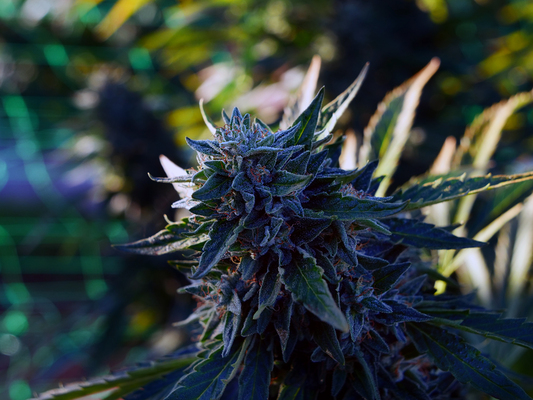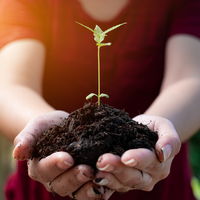
I believe many novice growers have encountered this situation. Although I watered the plants regularly, the plants did not grow as well as expected or they even died.
How is this happening?
THE ROLE OF WATER IN CANNABIS GROWTH
As we all know, cannabis plants cannot grow without water. • Water is essential for the germination of seeds and growth of plants • Water is an important part of plants, all plants require more water and some less, depending on their genetic makeup • Water serves as a medium for the transport of chemicals to and from cells. Generally speaking, the transport of various substances in plants must also be dissolved in water. • Water regulates the temperature and cools the plant
OVERWATER AND UNDERWATER
Improper watering can affect the healthy growth of cannabis, especially overwatering. If overwatering, leaves start to droop and appear curled down. When overwatering is not addressed, the leaves are discolored and the leaves are starting to turn light yellow. Because plants suffocate at the roots and cannot take their nutrients. Under watered plants will also appear sick and weak. Their leaves will become dry and droop, and the tips of the plants may bend in one direction. These signs are similar to overwatering, but the signs of water deficit will be relieved when supplemented with water. And underwater can cause nutrient burn in cannabis.
WHEN TO WATER CANNABIS PLANTS
How to tell if your plants are ready to be watered? There is a simple way, dip your finger into the soil about your first knuckle depth and feel the soil dry, then your cannabis needs to drink water. Some experienced gardeners will test whether it feels lighter due to lack of moisture by lifting the pot. If you're new to this, you can compare the weight of a fully watered pot to a fully dry pot. You can write down how often you water your plants and write this in a log. Keep your cannabis plants watered on time.
HOW MUCH WATER DOES CANNABIS NEED
How much water the cannabis plant needs depends on several factors, including the medium, temperature and the stage of its life cycle. (1)Medium Medium varies in how much water they can hold and how quickly they evaporate. For example, if your substrate contains more perlite, it will allow more oxidation, which increases the rate of evaporation, or if it contains a lot of cocoa fibers, moisture evaporation may be possible due to the cocoa's ability to retain moisture longer It takes longer. (2)Temperature Cannabis is a plant that tolerates high light intensities. Cannabis receives more heat and light and has higher water and nutrient needs. The warmer the temperature, the more water the plant consumes, so it will need to be watered more frequently. (3)The Seedling stage: Seedlings don't yet have well-developed root systems, so they don't need much water. Use a cup to pour water slowly in small circles around the base of the seedling. Do not water until the surface of the soil is mostly dry. As the seedling grows, slowly increase the amount of water so that the circle around the base is always about the width of the leaf. Usually, water twice a day to keep the soil moist. Make sure the soil is well-drained in case too much moisture can suffocate the seedlings. Vegetative stage: As cannabis enters the vegetative phase, it needs more water as the roots develop and the leaves get larger. The best way to water your plant is to cycle wet to dry, which will encourage the most prolific root systems of cannabis. You water the plants once, then wait a few days for the root zone to dry out a bit before watering again. You go through cycles of watering and drying, and you'll need water more and more often. This will be a good sign that your roots are expanding. Start from the center, then work your way out to the edges. This will encourage the roots to spread out and send nutrients throughout the pot. Keep watering until you see excess water draining out the bottom. When you use small size pots, watering once a day is enough; when you transfer cannabis plants to large pots, water them every 2-3 days. This is not a hard and fast rule, please water according to the actual situation. If the soil remains moist for more than 4 days, then the soil has a drainage problem or is overwatered. Flowering stage: From flowering to late flowering, cannabis plants consume less water, so taper watering. You can water every 2-3 days, and make sure not to water your plant more than usual to prevent overhydration, root rot, and stripping of the soil’s nutrients.
WATER QUALITY
To grow healthy, strong cannabis plants, you need clean water. Water quality varies by region, and most city water is chlorinated to kill bacteria that are harmful to humans. Chlorine is easy to remove, so water is often left standing for 24-48 hours so the chlorine can evaporate. The pH of the water will also vary. Cannabis plants grown in soil should receive a pH of 6.3-6.8. The correct pH helps cannabis absorb nutrients. Simply use a pH tester before you water your plants.
FLUSHING
Flushing is an important part of the cannabis growing process. Flushing the cannabis plant requires the intentional use of clean water to remove any nutrients from the soil. This is done to remove nutrients that have built up from the use of fertilizers before they affect the flavor and flavor of the cannabis. quality. Flushing occurred over the last two weeks of harvest when the nutrient solution was replaced with clear water during routine irrigation events. Problems with too many nutrients and inappropriate pH levels can also be ameliorated and corrected by flushing the cannabis.











